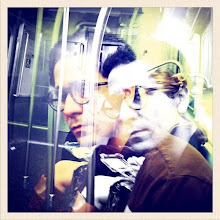From Grammar to Rhetoric, there is no exegetic escalation without expansion. Grammar, as a rigid structure of definition, is closed or more enclosing than Rhetoric. Rhetoric is an exhibition of the permeability between terms.
If we take these two as bifurcating epistemes in the history of language at any given time, we are doing great disservice to the nature of language and the stake of humanity in the annals of history. One comes to know of oneself by mirrors. Rhetoric is nothing without the face of Grammar upon which to reflect.
As a thought in this reflection, allegory is best understood. Our hermeneutics are already always established. Our learning and skill with signs are not factors which we must consider before we inquire. Emulation and linkage occur, more or less, rather than are enacted. We indeed are often passively active. Allegory, then, occurs.
Unlike metaphor, which is an expressed relation between things, allegory is a resemblance of relationships. More about happenings, it seems often to just happen. When it happens, however, there are distinct registers which it can assume.
Closed allegory, or rigid allegory, or allegory which is less thoughtful in the mirror and more exactingly observant, occurs when the figures in an allegorical comparison are meant to be deciphered back into their original status. It is codification intended for decodification with the legend articulated in the composition. Certain medieval morality tales come to mind as the most obvious examples ('Pearl' and the 'Romance of the Rose,' though the best example is definitely the 400 AD 'Psychomachia' by Prudentius, in which Hope, Chastity and Humility battle Pride, Wrath and Avarice for the human soul).
Open allegory, or allegory which is more unsettled in its cognitive process in the mirror, occurs when Rhetoric is allowed to think about itself as Grammar and about itself as Rhetoric thinking about itself as Rhetoric and Grammar. These allegorical constructs have no defined decoding scale. They are not exacting. Inexact resemblances of action occur as early as 'Piers Ploughman' in English, but the happening goes back as far as humans began noticing their gestures mirrored in others, though somewhat inexactly. 'Piers' is a psychomachia that disturbs and renders breachable the boundaries between allegorical resemblers.
The more open that allegory becomes the more sympathetic that it feels. Emotive allegory is the most human allegory, the nearest to allegory in its purest sense. Shadenfreude is a deeply disturbing occurrence of allegory in the mind: Glee in a negative upshot which could well be our own, and in that case not so gleeful. The relationship is determined as an emotive corollary that simultaneously associates us with and separates us from a similar other. Being a distinctly German term, it is perhaps the Germans that best understand this. Herzog's 1970 'Even Dwarfs Started Small' allegorizes revolt and liberation in a disturbingly comical literalization of allegorical relationship.
The movie is cast entirely with dwarfs, who overrun the prison-complex in which they are kept. The mirror of seeing ourselves in a lesser other is literalized and, unlike allegory in which we decipher A for X, B for Y, and C for Z, the correlative between the viewer and the miniature figure for the viewer is an emotive glee.
The midgets run amok in the compound--killing a pig, stealing a truck, tormenting two blind children, crucifying a monkey--all while laughing maniacally. The viewer inevitably laughs with them or at them (the distinction is difficult to determine), and in so doing we are living out the emotive status of revolt. They laugh at the suffering of others and we laugh at them, laughing in effect at ourselves, albeit in miniature.
The struggle for liberation, the peril of extremism and zealotry, the violence and decimation of oppression and revolt on the human psyche are lived out in them and us. But they are not discretely allegorical: No moment or character stands in for another. The speculations of Rhetoric are far from the face of Grammar. It is here imagining itself as someone else, or rather speculating on the permeability of human action.
No other film has made these thoughts as lucid to me. Its means are, undeniably, demented and over-literalizing. Often we need a swift boot to the head to wake us from a deep sleep.
Sunday, February 8, 2009
Subscribe to:
Post Comments (Atom)




No comments:
Post a Comment